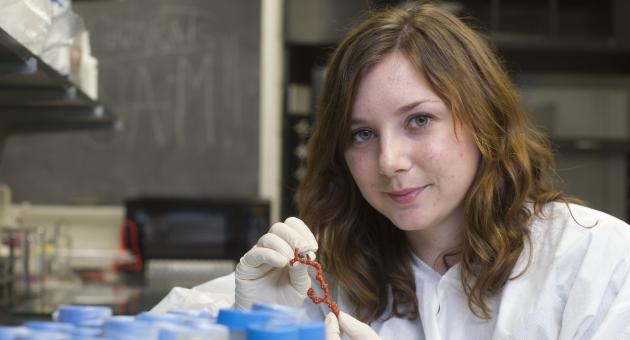Bio major discovers a future at sea

When most college students take a cruise, it’s usually during spring break and involves tropical ports of call and many hours of revelry.
But for Temple biology major Cheryl Doughty, a college cruise in December 2010 meant seven days in the Gulf of Mexico near one of the worst oil spills in history, with long, hard hours of collecting and preserving deep water coral specimens brought up from the seafloor.
The 22-year-old native of Hilltown, Pa., had come to Temple in the fall of 2008 like a lot of other freshmen majoring in biology — with thoughts of a career in medicine. But she soon saw her future not in medical school, but in research.
Her epiphany came in spring of her freshman year, when she took the honors "Introduction to Biology" course taught by assistant professor Erik Cordes, a marine biologist who has been studying deep-water coral communities in the Gulf of Mexico, particularly those impacted by the Deepwater Horizon oil spill in April 2010.
“After taking that course, I knew I wanted to get into research,” said Doughty, a student in Temple’s Honors Program who is graduating with a bachelor of sciences degree in biology.
She talked with Cordes, who suggested she apply for the College of Science and Technology's Undergraduate Research Program, which provides opportunities for students to gain hands-on research experience while pursuing their undergraduate degrees. She applied in fall 2009 and began working in Cordes’ lab in January 2010.
“I was aware of his work because he had talked about it a little bit in his introductory biology course, but I really didn’t know the magnitude of all the research that was going on in his lab,” said Doughty.
She started assisting Andrea Quattrini, one of Cordes’ graduate students, doing DNA extractions from the corals that had been brought back to the lab from the Gulf.
“Initially, it was very intimidating getting thrown into a new environment,” she said. “But you soon get used to it; learning how to do the tasks you are given and why you are doing them.”
“Cheryl quickly became skilled in the molecular laboratory,” said Cordes, who saw Doughty growing as a researcher as she gained extra responsibilities on other projects in the lab and developed her own research project.
Her work in the lab impressed Cordes enough that he invited her along on a week-long National Science Foundation-sponsored research cruise into the Gulf of Mexico in December 2010.
“That was my first time out at sea, and it was kind of overwhelming. I didn’t know what to expect, but I felt really honored that he invited me to go,” said Doughty, who worked with Quattrini on collecting and preserving coral specimens that were brought up from the seafloor by the submersible, Alvin.
“She really opened up during this experience and became very comfortable interacting with some of the leading scientists in the field as well as her own peers,” said Cordes. “Having never been to sea before, she adapted well to what can often be a grueling schedule and workload.”
Her hard work has been recognized with acknowledgements in journal articles being published by Cordes’ lab, as well as by other coral biologists, ecologists and environmental researchers. A poster of her research investigating population dynamics of one of the key species of deep-water gorgonians, and one that was impacted by the Gulf oil spill, won first place at the Fifth International Symposium on Deep-Sea Corals held in Amsterdam in April.
“I guess all this hard work has paid off and people really respect what I’m doing,” said Doughty, who will attend graduate school for forest eco-systems ecology.
Not bad for someone who didn’t envision herself at Temple in the first place. “My parents really helped me make the decision to come to Temple,” she said. “In the end, it turned out to be the absolute best decision for me.”